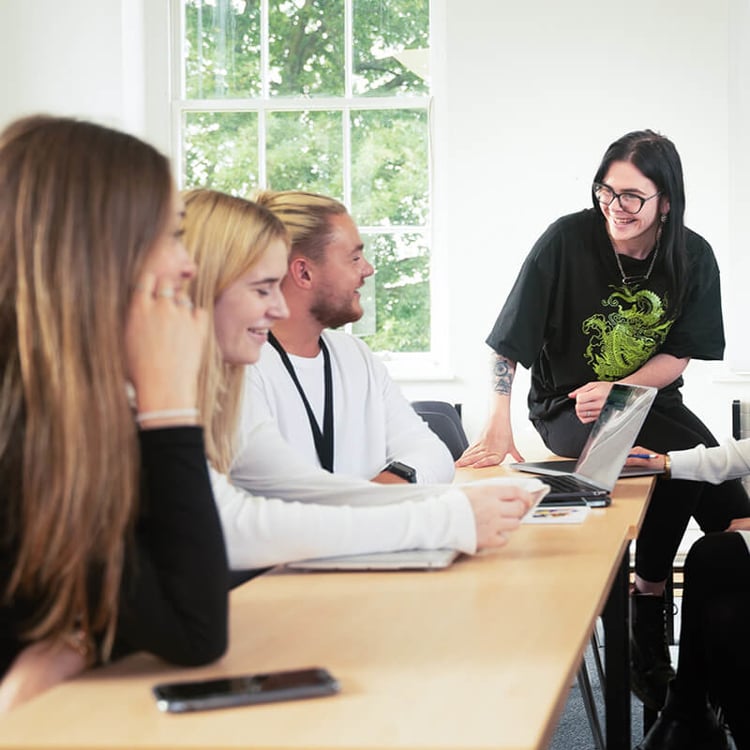/ Undergraduate /
Start date:
September 2025
You'll need:
112–128 UCAS points (or equivalent)
Foundation Year: 64–80 UCAS points (or equivalent)
UCAS code:
C820
C821 (if choosing Foundation Year)
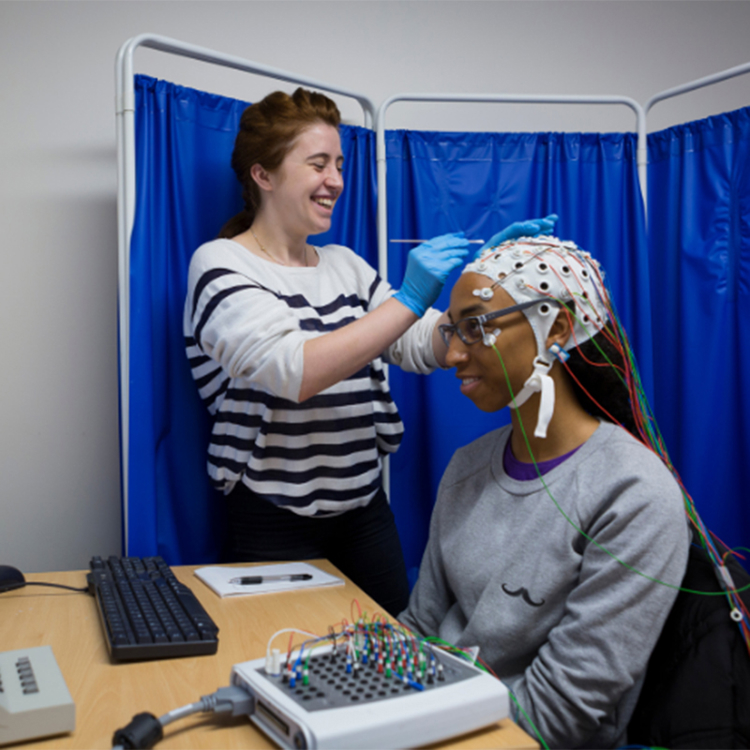
On-Campus Open Day
Saturday 12 July 2025
Welcome to our BSc Psychology and Cognitive Neuroscience and discover how we think, learn, and perceive the world around us. Delve into the cutting-edge research, neuroimaging techniques, and cognitive psychology principles that underpin this dynamic field.
Did you know?
You'll learn from expert researchers in the field, and have access to our state-of-the-art cognitive neuroscience facilities.
Top 3 modern university in London
(Complete University Guide 2025)

Ranked in the top 15% in the world
Times Higher Education Young University Rankings 2024

#8 in England for undergraduate student satisfaction
National Student Survey 2024

Modules
Modules Details: This module provides an opportunity to maximise your success within and beyond your degree. Through interactive lectures and seminars, you will explore topics that prepare you for university, postgraduate study, and the workplace. Sessions address procrastination, time management, and anxiety, helping you reach your full potential. You will develop research and reporting skills essential for psychology and related fields. The module also explores artificial intelligence (AI), emphasising its role alongside human intelligence. Additionally, you will identify and develop key skills, gaining insight into future career opportunities and professional growth, empowering you to excel in your chosen path.
How you’ll learn: You will be taught through a mixture of lectures and seminars. Lectures will cover key information and concepts to support your personal development. The seminars offer hands-on opportunities to apply lecture concepts in practice. You'll work independently and with peers to develop skills such as resource finding, debating, analysing, and presenting. You will also learn to use AI critically, ethically, and creatively—for example, for feedback, discussing complex ideas, and interview practice. This will help deepen your understanding while identifying AI’s limitations. Seminar activities will also support your assessments, enhancing your ability to engage with AI effectively and refine your academic skills.
Assessment: The assessments provide engaging ways to showcase your skills and understanding. You will be evaluated through a presentation, a critical debate, and a reflection. These tasks will enhance your ability to communicate clearly, present information effectively, and write persuasively. You will also develop skills in using AI for critical debate and reflection. These assessments will strengthen key abilities essential for your degree, postgraduate studies, and many workplaces, preparing you for future academic and professional success.
Module details: In this module, you will explore the foundations of psychology, gaining essential knowledge for your degree. You will study historical perspectives and key areas, including cognitive psychology, which examines mental processes; biological psychology, which links biology and behaviour; developmental psychology, which explores human growth; and social psychology, which investigates social influences. You will also consider individual differences. By integrating these perspectives, you will develop a well-rounded understanding of psychology and essential research methods, preparing you for further study and careers in related fields.
How you'll learn: You will be taught through lectures and seminars. Lectures provide an overview of each topic, highlighting psychology's contributions and applications. Seminars, linked to lectures, offer interactive engagement through discussions, debates, and quizzes. Activities may include applying concepts to real-world issues and research practical's illustrating psychological methods and data interpretation. Each seminar is tailored to its topic while supporting assessments. This approach ensures a dynamic learning experience, deepening your understanding of psychology in practical contexts.
Assessment: Assessment for this module includes a poster and a portfolio, helping you develop research, presentation, and written communication skills. You will enhance your ability to summarise information, evaluate material, and think analytically. These skills are essential for your degree, postgraduate studies, and are highly valued by employers.
Module details: This module introduces research approaches and data analysis methods used in psychology and related fields. You will learn to develop research questions and analyse data using both quantitative and qualitative methods. Quantitative analysis includes statistical techniques to describe data and explore relationships, while qualitative methods focus on identifying themes in text or interviews. This knowledge is essential for your degree, particularly for further data analysis and your final-year research project, as well as for postgraduate study and workplace applications.
How you'll learn: This module combines lectures and workshops to develop your understanding of research approaches and data analysis. Lectures will introduce key concepts and theories, while workshops provide hands-on experience in developing research questions, designing studies, and analysing data. You will also learn to use various software packages for data analysis. These interactive workshops will reinforce lecture content and support your assessments, ensuring you gain practical skills essential for conducting research throughout your degree and in future academic or professional settings.
Assessment: In this module, you will be assessed through a poster on a specific research question and a portfolio including tasks such as a literature review and research write-ups. These assessments will develop your research, data analysis, written communication, and presentation design skills, which are essential for your degree, postgraduate studies, and are highly valued by employers, enhancing your employability.
Module details: This module offers a comprehensive understanding of neuroscience, covering the nervous system's structures and functions, including key brain areas. You will learn how we sense the environment, control movement, and regulate bodily processes. The course also explores the communication between cells in the nervous system, the impact of various substances, and the development of the system. Additionally, you'll gain knowledge of techniques like MRI and EEG for investigating brain functions. This foundation will support your future studies and career in neuroscience.
How you’ll learn: This module will be taught through a combination of lectures and seminars. The lectures will provide essential core knowledge, while interactive seminars will deepen your understanding of the nervous system's structures and functions. In seminars, you will engage in practical activities, such as exploring the effects of damage to different systems and applying neuroscience to address these impacts. Additionally, seminar activities will support the module's assessments, helping you further develop and apply your knowledge.
Assessment: Your understanding of the nervous system in this module will be assessed through a presentation and a portfolio. These assessments will evaluate your grasp of the nervous system's structures, functions, and neuroscience techniques, which are crucial for your degree. They will help develop your written and oral communication skills, as well as your ability to synthesise, summarise, and apply knowledge—skills essential for the remainder of your degree, postgraduate studies, and various career paths.
These modules are those we currently offer and may be subject to change.
Module details: This module will develop your knowledge of key areas in psychology, including social psychology, developmental psychology, and individual differences. You will explore how social influences shape thoughts and behaviours, how cognitive, social, and emotional development occurs across the lifespan, and how individuals differ in these processes. By evaluating different explanations for human behaviour, you will consider real-life applications, such as the impact of social media, peer influences, neurodiversity, and identity formation. This knowledge is essential for further study on social and developmental psychology and is valuable for careers in education, healthcare, social care, and community settings.
How you'll learn: This module is delivered through lectures and seminars, covering conceptual, theoretical, cultural, and historical perspectives on behaviour, identity, and individual differences. Lectures will link content to current affairs, while seminars will include interactive activities such as quizzes, discussions, and practical research exercises. You will explore real-world applications, such as identity formation and intelligence testing, while developing teamwork and self-reflection skills. These transferable skills will benefit various career paths, and seminar activities will also support you in preparing for assessments.
Assessment: You will be assessed through a poster and a portfolio, which will enhance your skills in presentation design, communication, and the ability to summarise, synthesise, evaluate, and apply psychological knowledge. These skills are essential for further study and postgraduate education, as well as highly valued by employers, supporting your future career development.
Module details: In this module, you will explore how neuroscience can be applied to real-world situations and research. You will learn about neurological, psychological, and neurodevelopmental conditions, and how neuroscience aids in diagnosis, treatment, and interventions. The module covers everyday applications, such as improving cognitive and emotional regulation, as well as links to law, education, consumer behaviour, and drug development. You will gain hands-on experience in research design, data analysis, and cognitive neuroscience, helping you explore potential career paths in the field.
How you’ll learn: This module will be taught through a combination of lectures, seminars, and workshops. Lectures will provide background knowledge and the application of neuroscience research. Seminars will allow you to explore how neuroscience can improve lives and design your own studies, while also reflecting on your career development. Workshops will offer hands-on experience in designing and conducting research using cognitive neuroscience paradigms. Additionally, seminar and workshop activities will support your preparation for the module assessments.
Assessment: Your knowledge in this module will be assessed through a presentation and a research report. These assessments will evaluate your ability to synthesise, summarise, and critically assess relevant literature. The presentation will focus on applying your knowledge to a real-world issue, while the research report will develop your skills in study design, data analysis, and reporting findings in cognitive neuroscience. Both assessments will enhance your written and oral communication skills, preparing you for further studies and careers in neuroscience.
Module details: In this module, you will explore the fundamental processes underlying human cognition and the relationship between physiological functions and mental processes. Key topics include learning, perception, attention, memory, and language, alongside the neurobiological basis of psychological experiences. Using current neuroscience research, you will develop an understanding of how biological factors influence cognition. Through theoretical study and empirical research, you will gain essential knowledge for further study, postgraduate education, and careers in psychology, neuroscience, and related fields, enhancing your academic and professional development.
How you'll learn: In this module, lectures and seminars will explore conceptual, historical, and contemporary ideas in cognitive and biological psychology. Lectures will cover key concepts and theories relating to topics in cognition and neuroscience. Seminars will include practical activities to apply theories from lectures and provide support for assessments, encouraging critical engagement with the material.
Assessment: In this module, you will be assessed through a presentation and a portfolio, enabling you to further develop skills in effective communication, critical handling of materials, and scientific reasoning to explore alternative approaches and solutions—key competencies for your future studies and employment.
Module details: In this module, you will expand your understanding of research approaches and data analysis methods in pPsychology and related fields. You will develop skills in advanced quantitative and qualitative analysis, including ANOVAs, regression, psychometrics, and qualitative methods like interpretative phenomenological analysis (IPA) and discourse analysis. This knowledge will be essential for your degree, particularly your independent research project in Year 3. More broadly, mastering research methods will enhance your ability to evaluate evidence throughout your studies. These skills are also highly valuable for postgraduate study and a wide range of careers that require data analysis and critical thinking.
How you'll learn: This module will be delivered through a combination of lectures and workshops, with lectures covering key concepts and theories in data analysis. In workshops, you will apply this knowledge by developing and conducting research studies, analysing data, and engaging in activities that support your assessments.
Assessment: You will be assessed through a qualitative and a quantitative research report, where you will describe the study's background and methods, analyse a dataset, and interpret the findings in the context of existing research. These assessments will enhance your research, data analysis, and written communication skills, which are essential for your degree, postgraduate studies, and a wide range of careers.
These modules are those we currently offer and may be subject to change.
This course offers all students the option of a one-year paid work placement, to boost your employability even further. If you choose this route, you will take the placement following year two of your course, and then return to complete your degree.
Why take a placement?
A placement year is the perfect opportunity to gain valuable work experience, to build on the career skills we will teach you on this degree. The connections you make on the placement will improve your career prospects further, and equip you with the skills you need to secure graduate-level employment.
How we support you
The University's Placement and Work Experience Team are experts at helping you to secure a placement. They will work closely with you from the start, helping you research potential employers, discover placement opportunities, create and pitch your CV, and will coach you to perform well in interviews. We aren't able to guarantee a placement, but our sector-leading advisors will give you the best possible chance of securing one.
Find out more about how we'll support you
We understand that your plans might change once you start your programme. If you decide not to do a placement, you will have the option of completing the three year version of your programme.
Whatever your choice, you will have access to many opportunities for work experience through our Placement and Work Experience Team, and access to face-to-face and 24/7 online careers support.
Module details: In this module, you will apply your knowledge of psychological research methods and data analysis to design, conduct, and report on an independent research project. You will formulate research questions, collect and analyse data, and interpret your findings in the context of existing literature, considering their implications. The available projects will cover various areas of psychology, allowing you to choose a topic of personal interest. The skills gained in planning, executing, and reviewing research are valuable for postgraduate studies and many careers.
How you'll learn: You will be supported by a supervisor with expertise in your chosen topic area, meeting regularly, typically in small groups. In addition to these meetings, lectures and workshops will help develop your research skills and support your work for the module, with lectures covering report-writing and data analysis methods, and workshops offering opportunities to apply these concepts to your own project. These sessions will provide valuable support for your assessments throughout the year.
Assessment: Whichever project you choose, you will need to write a project report and deliver a poster presentation, helping to develop your written and oral communication skills. Throughout the module, your work will also enhance your research and project management abilities, equipping you with a range of transferable skills that are valuable for postgraduate studies and various graduate careers.
Module details: This module will enhance your workplace professionalism and personal development, equipping you with key skills for your career. You will develop communication, reflective, and self-presentation skills while applying psychological literacy to ethical considerations, social responsibility, and self-regulation. Topics include leadership styles, emotional intelligence, and conflict management. You will complete a personal development portfolio, gain at least 30 hours of work experience, and earn certifications in areas such as diversity and leadership. This module will strengthen your CV and prepare you for future career opportunities, integrating theoretical concepts into real-world practice.
How you'll learn: This module will be delivered through a combination of lectures and workshops. In lectures, you will learn key career skills and explore potential career paths, while workshops will allow you to apply these concepts to your own personal development, reflecting on your strengths and areas for improvement. The workshops will also support your preparation for the assessment.
Assessment: You will be assessed through a portfolio, which will require you to complete the Chancellor's Career Award, at least 30 hours of work experience, and online training. Within the portfolio, you will reflect on your personal development and skills gained from the Chancellor's Career Award and work experience. You will also reflect on a potential career path after your degree and your next steps in personal and professional development. This assessment will enhance your reflective and written communication skills, which are highly valued in various careers and will support your career progression.
Module details: In this module, you will learn about the impact of brain damage on cognitive functioning, developing your understanding and critical analysis of key areas in neuropsychology across the lifespan. You will explore each major lobe of the brain and cover both sustained and progressive neuropsychological disorders. Each week will focus on a specific topic within the field. This module will enhance your knowledge of cognitive psychology and neuroscience, particularly useful if you are interested in a career working with neuropsychological patients or related research.
How you'll learn: You will be taught through a combination of lectures and seminars. The lectures will provide the foundational material for each topic, while seminars will involve activities such as critical discussions of key papers and case study videos on neuropsychological conditions. These in-depth discussions will help you explore theoretical, methodological, and statistical issues, deepening your understanding of current debates in the field. The seminars will also support your preparation for the module assessments, enhancing your overall learning experience.
Assessment: Your knowledge of neuropsychology will be assessed through a presentation and a stakeholder report. These assessments will help you build on the critical evaluation skills developed in previous years. The module will further enhance your oral and written communication, as well as your reflexive skills. These skills are highly valued for postgraduate studies and are essential for employment in a range of careers related to psychology and neuroscience.
Module details: In this module, you will explore changes in the brain and their links to mental health and wellbeing across various clinical conditions. You will learn about the effects of mental health conditions such as anxiety, mood disorders, and schizophrenia, as well as factors promoting brain health, like immune system function, sleep, and gut health. You will also study neurodevelopmental conditions like autism and ADHD, and neurological disorders such as stroke and Alzheimer’s disease. This module offers valuable insights for postgraduate studies and careers in clinical settings and research.
How you’ll learn: Throughout this module, you will be taught through a combination of lectures and seminars. The lectures will provide an overview of key research and current questions for each topic. Seminars will allow you to discuss these topics in depth, enhancing your understanding, and consider how further research can be developed to apply theoretical knowledge in improving people's lives. Seminar activities will also support your preparation for the module assessments, helping you apply what you've learned in a practical context.
Assessment: Your knowledge in this module will be assessed through a public communication and a stakeholder report. These assessments will help you synthesise, summarise, critically evaluate, and consider the impact of knowledge. They will also develop your ability to apply knowledge to real-world issues and enhance your communication skills for non-academic audiences. These assessments will provide you with a range of valuable skills, which are crucial for postgraduate studies and highly sought after in many professional settings.
These modules are those we currently offer and may be subject to change.
This course offers a foundation year, which takes place at the beginning of your studies. Studying a foundation year will give you academic and practical experience, and a strong introduction to your subject, ensuring you succeed on your undergraduate degree.
30 credits
You will develop your core academic and integrated English language skills of speaking, listening, reading and writing. You will become familiar with key academic skills and concepts, such as referencing methods and awareness of academic integrity and tone. You will apply these skills and knowledge to both broad topics and also your chosen subject pathway.
Teaching and learning
You will be required to actively engage in on-campus learning for up to 10 hours a week.
You will be taught through a full range of teaching and learning methods, which include lectures, seminars, workshops, discussion groups, group directed tasks and presentations. This will enable you to learn from your peers and tutors in both structured and information settings.
You will be encouraged to think creatively about your approach to learning and discussions with your peers. You will also have access to recordings, resources, links and signposting through Moodle to enrich your learning.
Assessment
You will be assessed through group and individual presentations, comparative and reflective essays, multiple choice exams, coursework and reports, oral exams, portfolios, case studies and blogs.
30 credits
You will develop your research, numeracy and information technology skills. You will investigate the difference between primary and secondary research, conduct your own research project and demonstrate your findings through data analysis. You will also develop your awareness of equality, diversion and inclusion in the UK, through a real-world issue; discrimination in the workplace.
Teaching and learning
You will be required to actively engage in on-campus learning for up to 10 hours a week.
You will be taught through a full range of teaching and learning methods, which include lectures, seminars, workshops, discussion groups, group directed tasks and presentations. This will enable you to learn from your peers and tutors in both structured and information settings.
You will be encouraged to think creatively about your approach to learning and discussions with your peers. You will also have access to recordings, resources, links and signposting through Moodle to enrich your learning.
Assessment
You will be assessed through group and individual presentations, comparative and reflective essays, multiple choice exams, coursework and reports, oral exams, portfolios, case studies and blogs.
30 credits
This module focuses on an in-depth exploration of applied psychology, drawing on foundational theories and models that explain human behaviour. You will engage with the issues and debates around some of the core psychological concepts, such as prejudice, stereotyping, group dynamics, and conformity, gaining a broad understanding of what influences human behaviours.
The module introduces the bio-psycho-social model within health psychology, providing a holistic framework for understanding health-related behaviours. You will gain a knowledge of how different psychological theories and models can be applied to understand the development of risky health behaviours and can be applied to design effective health intervention strategies.
You will learn the skill of collaborative group work, which is an integral part of the module, encouraging you to apply your knowledge of psychological theories to analyse and present a case study on risky health behaviour. You will also develop the skill of critical analysis, integrating various theories and models in psychology to explain risky health behaviour and suggest intervention programs.
Teaching and learning
The teaching delivery for each module consists of one, one-three-hour lecture and one, two-hour seminar per week. You will learn through a blend of lectures and interactive sessions, case studies and group presentations.
There will be an additional 30 minutes of online support per week. This will consist of individual tasks such as quizzes, posting on discussion forums, watching videos and taking notes, and reading articles or chapters.
Assessment
This module will be assessed using a written assessment and a group presentation.
50% - written assessment, composed of two parts; essay and self-reflection. You will write an essay on your knowledge of at least two psychological theories or models to explain why people develop risky health behaviours and propose and evaluate intervention strategies. You will reflect on your experience and learning journey as you prepared for and wrote the essay.
50% - group presentation, where you will apply knowledge from psychology theories to plan health interventions on risky health behaviour.
30 credits
This module focuses on the different perspectives available in psychology to explain human behaviour.
You will get the opportunity to explore methods of scientific thinking and reasoning within a Psychology context in an enquiry-based way. Problem-based learning and blended learning (combines online and face-to-face time) approaches will facilitate deep, experiential learning.
You will gain knowledge on what scientific thinking is, how to distinguish this from pseudoscience and how the scientific cycle enquiry can be applied to the various perspectives in psychology.
You will be encouraged to explore how different perspective in psychology can explain human behaviour, scientific argumentation and ethical working practices in relation to current scientific topics as reflected in news reports, recent academic publications and historical case studies. You’ll gain the skill of critical thinking and how to apply concepts from psychology to explain everyday behaviour, as well as poster presentation and public speaking.
Teaching and learning
The teaching delivery for each module consists of one, one-three-hour lecture and one, two-hour seminar per week. Lectures will introduce the scientific basis of knowledge and research methodologies in the context of Psychology and empower you to distinguish between science and pseudoscience, while seminars will consist of individual and group activities on the weekly topics.
There will be an additional 30 minutes of online support per week. This will consist of individual tasks such as quizzes, posting on discussion forums, watching videos and taking notes, and reading articles or chapters.
Assessment
This module will be assessed using a group poster presentation and written assessment.
40% - group poster presentation, you will compare and contrast any two perspectives on psychology.
60% - written assessment, you will write a critical essay on how pseudoscience differs from science.
These modules are those we currently offer and may be subject to change.
Foundation Year
This course can also be studied with a foundation year (September entry only).
Our suite of Psychology programmes has a strong history of accreditation and has consistently been commended for our high-quality education and outstanding student experience by the British Psychological Society (BPS).
Following a recent review and enhancement, this programme has been carefully redesigned to continue meeting all BPS accreditation standards and is currently pending reaccreditation by the BPS in early spring 2025.

Skills
This exciting, unique degree will give you the skills to understand the relationship between the human brain and our behaviour, and which areas of the brain support these cognitive functions.
Cognitive neuroscientists explore how the brain and connections in the brain influence our mental processes, including our memory, perceptions and reasoning. Psychologists examine the developmental, psychological and environmental factors that influence our behaviour.
As a Roehampton student, we will ensure you graduate with an expert skillset. This includes:
- In-depth understanding of human behaviour and the functioning of the brain and its systems.
- Advanced skills in critical reasoning, analysis, and research as well as interpersonal and communication skills.
- Professional experience through our work experience module, so you can apply your knowledge and professional skills to your chosen workplace.
Learning
Your learning is tailored to the specific demands of the field of professional psychology and cognitive neuroscience.
This includes:
- Lectures: develop a critical understanding of theory and empirical research.
- Seminars and workshops: put your learning into practice with your tutors and fellow students.
- Laboratory practicals: learn and apply advanced laboratory skills.
- Discussions, debates and group projects: explore psychology and cognitive neuroscience in the real world, as well as the latest advancements in the field.
Check out the state-of-the-art psychological laboratories where you will be studying.

Dr Carla Startin
I am the Programme Leader for the BSc Psychology and Cognitive Neuroscience degree. My background is in cognitive neuroscience, and I joined Roehampton in July 2020. I am involved in teaching across different aspects of our BSc Psychology and Cognitive Neuroscience degree. My current and previous research relates to differences between people in their cognitive abilities and related brain activity, and neurodevelopmental conditions relating to these - firstly differences in terms of how we process information during social interactions, and secondly differences between people with Down syndrome and the development of dementia in this population.
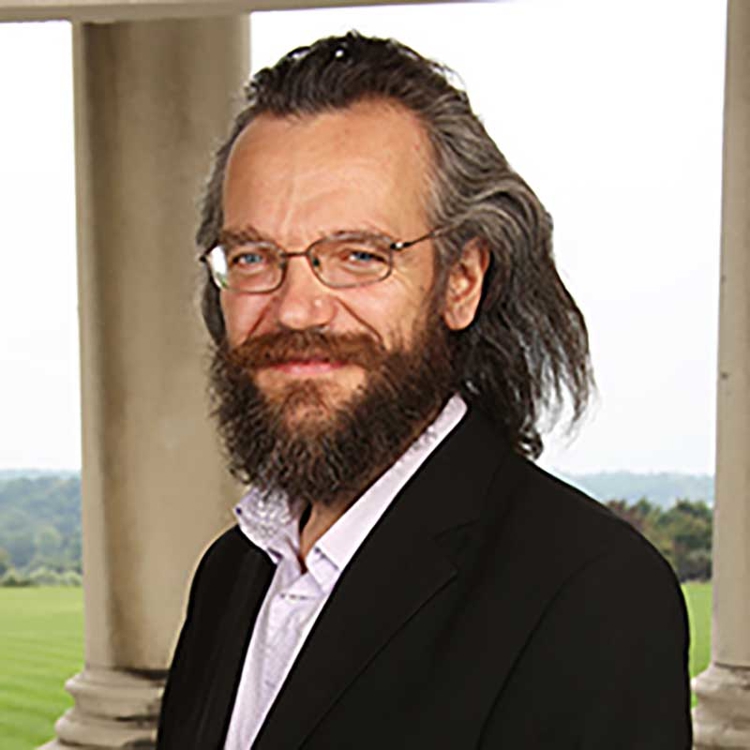
Dr Paul Dickerson
I’m Paul Dickerson, I’m a Principal Teaching Fellow and I started at Roehampton way back in 1991! Even though I have been at the University for nearly 30 years each year still feels fresh. I teach across multiple modules and programmes with a particular interest in qualitative research and social psychology and I want to enthuse everyone about this amazing subject. I love sharing my passion for psychology in all of my teaching and writing and – but don’t tell anyone – I do sometimes share a song I have written for the students that I teach. I have a particular interest in helping you to reach your full potential and I run weekly lunchtime sessions to help with this – use this link https://study.sagepub.com/psychologybrilliantessays to find out about the sorts of things covered. I hope that I will have the opportunity to help you enjoy this wonderful subject as much as I have.
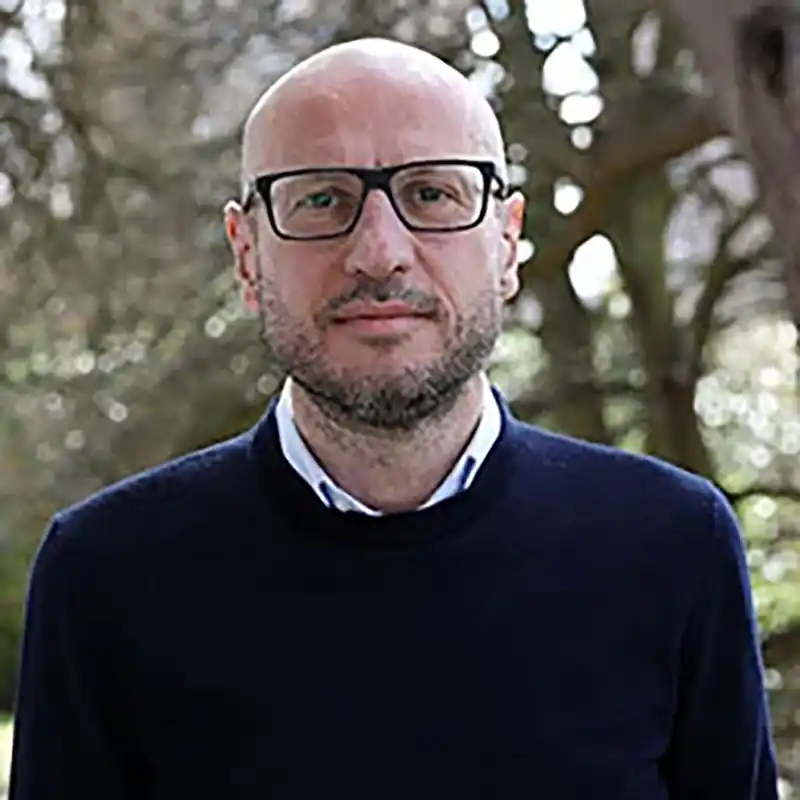
Dr Marco Sandrini
Hi, I am Marco! I have been at Roehampton since 2015. I graduated in Experimental Psychology at the University of Padua (Italy). I then obtained a PhD in Neuroscience at the University of Verona (Italy) and undertook a two-year post-doctoral fellowship at the Centre for Mind/Brain Sciences (University of Trento, Italy) and spent five-years as a research fellow at the National Institutes of Health (USA), the largest biomedical research agency in the world.
The focus of my research is interventions to enhance memory in aging and reduce the frequency of intrusive memories of trauma using the combination of neuroimaging and non-invasive brain stimulation.
I am primarily involved in the teaching of research methods and statistics and cognitive neuroscience. I am the module convenor for the second year undergraduate module “Psychological Research: Design, Analysis and Impact” and “Use of Cognitive Neuroscience Techniques” for the master in Applied Cognitive Neuroscience
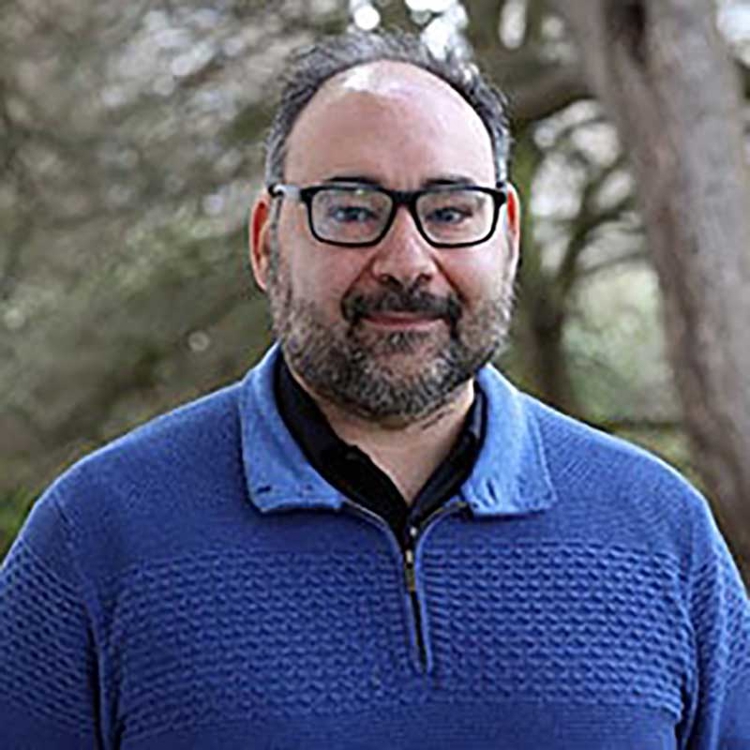
Dr Giorgio Fuggetta
I obtained my BSc and MSc in Psychology from University of Padua, Italy (2000), and received my Ph.D. in Neuroscience from the University of Verona, Italy (2006).
I was a postdoctoral research fellow at the Institute of Cognitive Neuroscience (ICN), University College London (2006-2007), and then a Lecturer in Psychology at the University of Leicester (2007-2016), before being appointed to the University of Roehampton London in 2016 as a Senior Lecturer in Psychology.
My current research explores the neural mechanisms underlying attentional control processes using electroencephalography (EEG) and Transcranial Magnetic stimulation (TMS) techniques. I am also conducting translational research in cognitive and educational psychology, studying the association between individual differences in executive function (EF) skills and academic achievement in adolescence. I teach techniques in cognitive neuroscience to MSc Applied Cognitive Neuroscience students and research methods, statistics and neuropsychology to BSc Psychology students.

Assessment
Through your specialised understanding of psychology and cognitive neuroscience, you’ll become an expert in applying theory to the real-world, advancing your academic and professional skills.
You’ll complete portfolios, case studies, presentations and research studies, which replicate the working world of psychology and cognitive neuroscience and prepare you for your career.
In your third year you’ll also complete an independent research project, allowing you to specialise and explore an area of psychology and cognitive neuroscience you are passionate about.
Career
You’ll be prepared to go into a range of careers and industries.
This includes:
- Scientific research and teaching in neuroscience and psychology.
- Further study in order to become a forensic, health, counselling, sport, occupational, educational or clinical psychologist.
- Pharmaceutical industry, including drug development, biotechnology and bioinformatics.
- Clinical and healthcare sector.
- Data science.
- Health science and health services research.
- Science communication, including museum work, public engagement and scientific publishing.
Your potential roles could be:
- Clinical psychologist
- Healthcare researcher
- Clinical trials manager
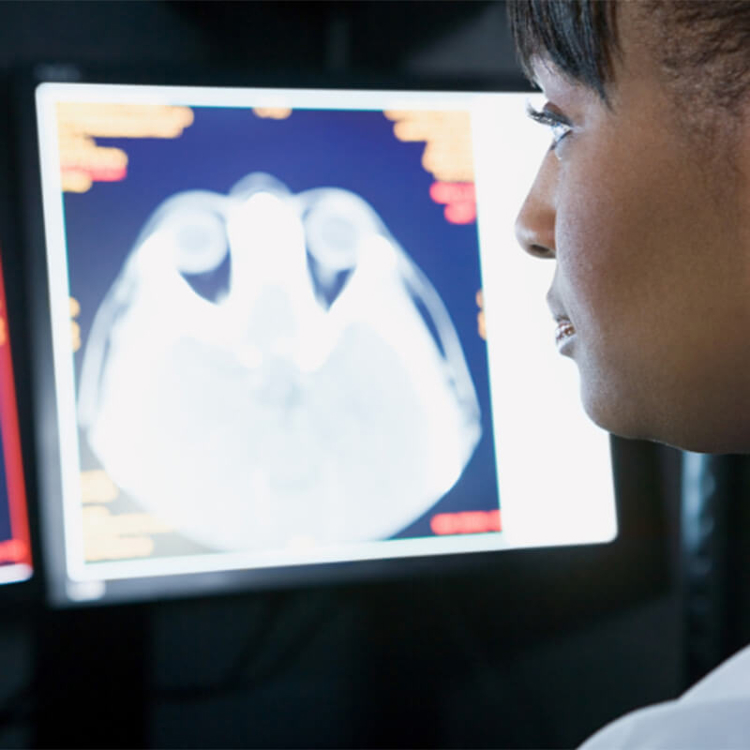
Open days
Get a real taste of our campus, community and what it’s like to study at Roehampton
Applying
Full-time UK undergraduate students apply through UCAS.
Course subject to curriculum enhancement and revalidation.
Entry tariff
112–128 UCAS points (or equivalent)
Foundation Year: 64–80 UCAS points (or equivalent)
Looking to work out your UCAS points or find out about our entry requirements? Find out more.
When we consider applications to study with us, we form a complete view of your achievements to date, and future potential, and can offer flexibility in entry requirements. Find out more about our Contextual Offer scheme.
Specific entry requirements
GCSE (or equivalent) requirement: Maths, Grade C/4.
General entry requirements
September 2025 entry tuition fees
UK (home) tuition fees
Undergraduate degree: £9,535
Foundation Year: £9,535
We offer a wide range of scholarships and bursaries. See our financial support pages for UK students.
We also provide other ways to support the cost of living, including free buses and on-campus car parking, hardship support and some of the most affordable student accommodation and catering in London. Find out more about how we can support you.
International undergraduate students apply through our direct application system.
Course subject to curriculum enhancement and revalidation.
Entry tariff
112–128 UCAS points (or equivalent)
Foundation Year: 64–80 UCAS points (or equivalent)
Looking to work out your UCAS points or find out about our entry requirements? Find out more.
When we consider applications to study with us, we form a complete view of your achievements to date, and future potential, and can offer flexibility in entry requirements. Find out more about our Contextual Offer scheme.
Specific entry requirements
GCSE (or equivalent) requirement: Maths, Grade C/4.
General entry requirements
September 2025 entry tuition fees
EU and international tuition fees
Undergraduate degree: £16,950
Foundation Year: £16,950
International Foundation Pathway: £16,950
We offer a wide range of scholarships and bursaries. See our financial support pages for international students.
We also provide other ways to support the cost of living, including free buses and on-campus car parking, hardship support and some of the most affordable student accommodation and catering in London. Find out more about how we can support you.




